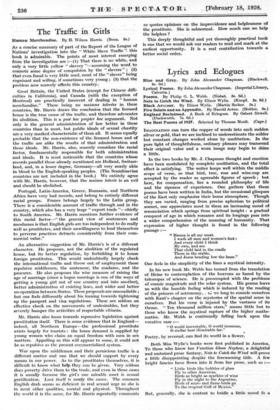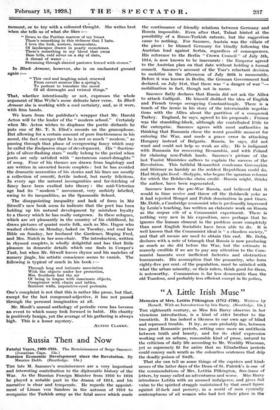Lyrics and Eclogues
Poems. By Philip G. L. Webb. (Nisbet. as. 6c1-)
Nets to Catch the Wind. By Elinor Wylie. (Knopf. 3s. 6d.) Black Armour. By Elinor Wylie. • (Martin Becker. 5s.)
Five Saints and an Appendix. By Harold Acton. (Holden. 6s.) England Reclaimed. A Book of Eclogues. By Osbert Sitwell.
(Duckworth. 7s. 6d.)
The Best Poems of 1927. Selected by Thomas Moult. (Cape.) IMAGINATION can turn the copper of words into such sudden silver or gold, that we are inclined to underestimate the milder but constant changes worked alone by meditation. In the pure light of thoughtfulness, ordinary phrases may transcend their original value and a worn image may begin to shine a little.
In the two books by Mr. J. Chapman thought and emotion -have been modulated by complete meditation, and the total effect is satisfying. The writer keeps well within the middle scope of verse, so that bird, tree, rose and wine-cup are accepted by the reader as agreeable figures of speech ; but here, for compensation, lies a rounded philosophy of life and the ripeness of experience. One gathers that these poems have been written in India, but the occasional glimpses of the East only emphasize their home atmosphere. Though they are varied, ranging from precise aphorism to political sonnet, one appreciates most in them an increasing mood of renunciation which springs from spiritual insight : a gradual conquest of age in which romance and its longings pass into a wider comprehension of the meaning of humanity. That expression of higher thought is found in the following passage :— " Manna is all my meat.
I wash all men and women's feet : And every child I think My own, and see That child laid in the cradle There in the stable.
And Jesus bending low the knee."
One feels in the simplicity of the lines a mystical intensity.
In his new book Mr. Webb has turned from the translation of Heine to contemplation of the heavens as bared by the telescopes of science. He is preoccupied with the problems of cosmic magnitude and the solar system. His poems leave us with the humble feeling which is induced by the reading of the primers of astronomy, we long to console ourselves with Kant's chapter on the mysteries of the spatial sense in ourselves. But his verse is injured by the vastness of its theme. " Ten thousand million stars," means little but to those who know the mystical rapture of the higher mathe- matics. Mr. Webb is continually falling back upon the vocative case :—
" 0 world inscrutable, 0 world immense, 0 stellar host illimitable far."
Poetry, by reversal, can find its world in a flower.
Both Miss Wylie's books were first published in America. To those who know her Venetian Glass Nephew, a delightful and sustained prose fantasy, Nets to Catch the Wind will prove a little disappointing despite the forewarning title. A few bright fancies have flown into it from her prose, such as :-
" Little birds like bubbles of glass Fly to other Americas,
Birds as bright as sparkles of wine Fly in the night to the Argentine, Birds of azure and flame-birds go To the tropical Gulf of Mexico."
But, generally, she is content to bridle a little mood fo a
moment, or to toy with a coloured thought. She writes best when she tali us of what she likes :- "Down to the Puritan marrow of my bones
There's something in this richness that I hate.
I love the look, austere, immaculate, Of landscapes drawn in pearly monotones. There's something in my blood that owns Bare hills, cold silver on a sky of slate, A thread of water . .
Streaming through slanted pastures fenced with stones."
In Black Armour, however, she is on enchanted ground again :- "This cool and laughing mind, renewed From covert sources like a spring's, To portent to translate the mood Of all distraught and twisted things."
That, whether intentionally or not, expresses the whole argument of Miss Wylie's more delicate later verse. In Black Armour she is working with a cool certainty, and, as it were, with firm hands.
We learn from the publisher's wrapper that Mr. Harold Acton will be the leader of the " modern school." Certainly when Mr. Acton wishes to displease the poetic diehards he puts one of Mr. T. S. Eliot's records on the gramophone. But allowing for a certain amount of pure fractiousness in his mood, the fact emerges that he is not so much " modern," as passing through that phase of overgrowing fancy which may be called the Endymion stage of development. His " fluctionz jets of silver-flashing stars " really belong to the period when poets are only satisfied with " nectareous camel-draughts " of song. Four of his themes are drawn from hagiology and are written in unvaried heroic couplets : but he has avoided the dramatic necessities of his stories and his lines are mostly a collection of concetti, fertile indeed, but rarely felicitous. In every age the natural incongruities and far-fetching of fancy have been exalted into theory : the mid-Victorian age had its " modern " movement, very unfairly labelled, owing to its inequalities, as the Spasmodic School.
. The disappointing inequality and lack of form in lifri Sitwell's new book seem to indicate that the poet has been holding up his natural development by mistaken loyalty to a theory which he has really outgrown. In these eclogues, which are Set pleasantly in the country of his childhood, he draws pictures of quaint rustic folk, such as Mrs. Hague who washed clothes on Monday, baked on Tuesday, and read her Bible on Sunday, her husband the Gardener, Moping Fred, and Mrs. Nutch in her arm-chair. The introduction, written in rhymed couplets, is wholly delightful and has that little pleasure in domestic details which one finds in Cowper's Task, but when Mr. Sitwell leaves rhyme and his snatches of nursery jingle, his artistic conscience seems to vanish. The following is typical of much in his book :— Through long and intimate association With the objects under her protection, Mrs. Southern had the air
Of being in league with inanimate objects, Conspirator with chairs and tables, Sentient walls, inquisitive-eyed portraits.
One's complaint is not that this is rather like prose, but that, except . for the last compound-adjective, it has not passed through the personal imagination at all.
Mr. Moult's annual anthology of periodic verse has become an event to which many look forward in habit. His charity is positively benign, yet the average of his gathering is always high. This is a lesser mystery.
AUSTIN CLARKE.







































 Previous page
Previous page